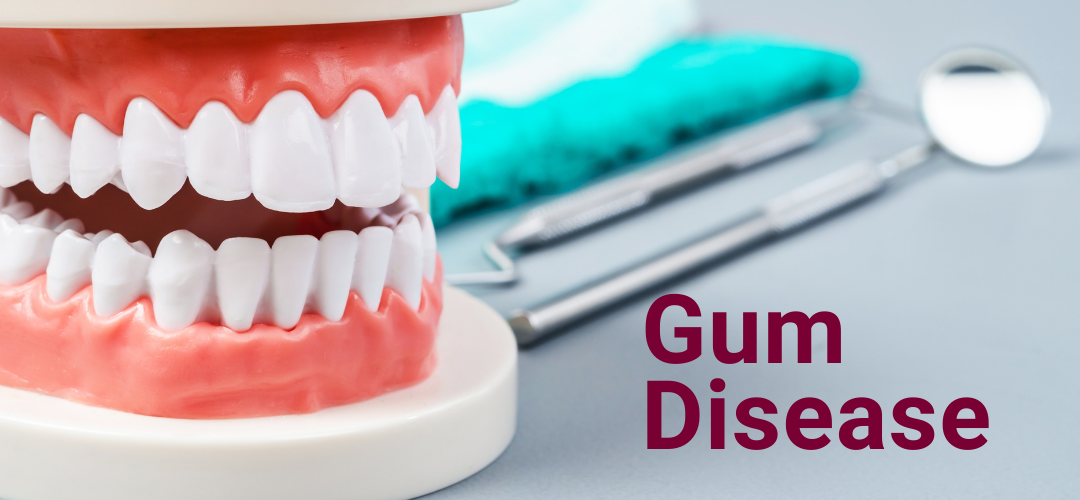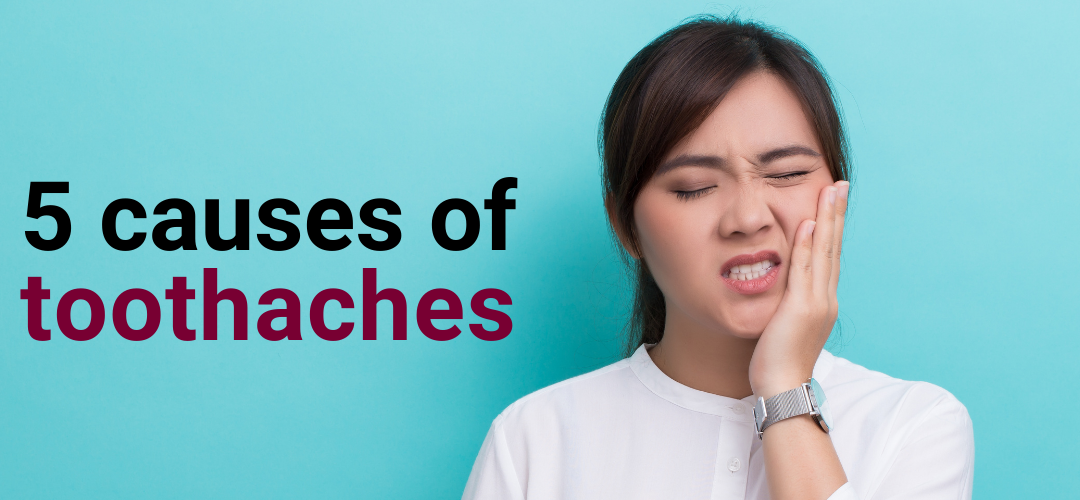
by Roseman Dental | Feb 23, 2021 | Dental Clinic Blog, Oral Health, Roseman Dental - NV, Roseman Dental - UT
Gum disease is caused by repeated attacks of the bacteria that live in dental plaque. Plaque is what builds up on our teeth after bacteria mix with sugars from the food we eat. The bacteria release acids and cause a sticky film to form. This layer can harden over time if we do not brush or floss at appropriate times. If plaque is left unattended for extended periods of time, it can start to degrade enamel, the outer layer of the tooth.
What Causes Gum Disease?
Some factors that cause gum disease are poor oral hygiene, a high sugar diet, frequent alcohol consumption, long-term tobacco use, diabetes mellitus, cancer, fluctuating hormone levels, and some others. There are three stages of gum disease – gingivitis, periodontitis, and advanced periodontitis.
What is Gingivitis?
Gingivitis is a type of gum disease where some presence of inflammation, redness, swelling, and bleeding occur, especially during brushing and flossing. The most common cause of gingivitis is poor oral hygiene which can lead to an accumulation of plaque. Gingivitis, however, can be reversed by maintaining a frequent routine of brushing at least twice a day and flossing daily.
What is Periodontitis?
Periodontitis is the intermediate stage of gum disease. In this stage, supportive bone and cartilage tissue deteriorate. Additionally, gum pockets start to develop, and plaque begins to deposit in the pockets below the gum line. To maintain the health of gum tissues in this stage, periodontal treatment such as scaling, and root planning are necessary to remove the plaque from deep pockets under the gum line.
What is Advanced Periodontitis?
If periodontitis is not maintained, it can progress to advanced periodontitis. In this stage, more bone is destroyed and cannot be reversed. Teeth may even be lost or shifted out of place. There are more aggressive forms of treatments which need to be done in this stage; without periodontal treatment, the teeth will likely require extraction. One of the treatment options for advanced periodontitis is flap surgery where the pocket size is reduced to maintain healthy gum tissue. Another treatment that can be done is bone grafting which prevents tooth loss by helping hold the tooth in place. The bone graft can be synthetic or may be composed of small fragments of the patient’s bone.
How can I Reduce my Chances of Gum Disease?
To prevent or reduce your chances of gum disease, you can incorporate the following measures in your lifestyle:
- Brush your teeth at least twice a day
- Use a soft bristled toothbrush or an electric toothbrush – they’re more effective at removing plaque
- Floss every day
- Use a mouth wash to help reduce the accumulation of bacteria and plaque eventually
- Schedule regular dental cleanings with your dentist – every six months (twice a year)
Gum disease can often lead to severe problems. The preventative measures listed above are ample ways of preventing gum disease. While maintaining a frequent oral hygiene routine is important, it’s extremely important to visit your dentist for regular cleanings every six months (twice a year). The cleanings provided by your dentist will help remove any remaining bacteria or plaque – leaving you with a healthy, bright smile!
For affordable, high-quality dental care in Henderson, Nevada or South Jordan, Utah contact Roseman Dental and Orthodontics.
Nevada Location
Utah Location
Article by Tanisha Khurana

Tanisha Khurana
DMD Candidate Class of 2023
Roseman University College of Dental Medicine
ASDA Chapter Fundraising Chair
Pediatric Club Outreach Coordinator

by Roseman Dental | Feb 16, 2021 | Dental Clinic Blog, Oral Health, Roseman Dental - NV, Roseman Dental - UT
Whether you know it or not, your mouth and heart are linked. Your heart – an organ about the size of a fist – pumps blood through your body. Your mouth – made up of numerous components, including your teeth – shares the bloodstream with your heart. Therefore, your oral hygiene could directly affect your heart health.
Can my Oral Health Affect my Heart?
Our mouths are loaded with bacteria—some good, and some harmful. Without proper oral hygiene, the harmful types of bacteria can cause cavities, gingivitis, and periodontal (gum) disease. Gum disease is a chronic inflammatory disease that affects the gum tissue and bone supporting the teeth. If left untreated, harmful bacteria in the mouth could enter your bloodstream through inflamed gums and cause additional issues—such as heart disease.
Numerous studies have linked poor oral health to heart disease. Although expects can’t yet agree if there is a direct connection between gum disease and heart disease, there are several indications they may be linked due to the inflammatory properties of both diseases. In fact, those with gum disease are almost 50 percent more likely to have a heart attack, according to the American Heart Association.
Am I at Risk for Heart Disease?
According to the Centers for Disease Control and Prevention (CDC), heart disease is the leading cause of death in the United States. About 1 in every 4 Americans die from heart disease each year. Knowing these facts along with the risks can help you identify if you’re at risk for heart disease.
Key risk factors include high blood pressure, high cholesterol, and smoking. There are also several medical conditions and lifestyle choices that can put you at risk, including:
- Diabetes
- Overweight and obesity
- Unhealthy diet
- Physical inactivity
- Excessive alcohol use
While scientific evidence hasn’t yet proven a cause-effect relationship between oral health and heart disease, researchers have uncovered oral bacteria within the fatty deposits of people with atherosclerosis – a disease in which plaque builds up in the arteries. Left untreated, the deposits have the potential to narrow arteries or break loose and clog them – causing a heart attack or stroke.
What are the Symptoms and Warning Signs of Gum Disease?
According to the American Academy of Periodontology, over half of American adults suffer from gum disease. Research has shown that gum disease is associated with other chronic inflammatory diseases—such as diabetes and cardiovascular diseases. Therefore, it’s important to know the symptoms and warning signs.
- Red, swollen, or tender gums
- Bleeding while brushing, flossing, or eating hard food
- Receding gums
- Loose or separating teeth
- Persistent bad breath
- Pus between gums and teeth
- Sores in your mouth
How Do I Protect Against Gum Disease?
Although more than 80 percent of American adults have some form of gum disease, it is preventable. It’s important to have a good oral hygiene routine. Adding these habits to your routine can really make a difference.
- Brush your teeth and tongue twice a day
- Floss at least once a day
- Swish with mouthwash
- See your dentist every six months for a checkup and cleaning
- Minimize sugary beverages
- Eat a well-balanced diet
Make the Connection Last
While they might not be directly connected, your heart and mouth rely on each other a great deal. Both your heart and mouth love when you practice good oral hygiene and eliminate risk factors. Removing harmful bacteria from your mouth ensures it won’t slip into your bloodstream and affect your heart. In addition, show your mouth and heart some extra love by reducing risk factors – quit smoking, increase intake of fruits and veggies, control your blood pressure, and eat low-sugar foods and drinks.
It’s important to stay up to date with your dental exams to ensure your oral health is in tip-top shape. If it’s been a while since you visited the dentist or you’re experiencing any of the symptoms or warning signs discussed in this article contact Roseman Dental to schedule a dental exam.
Nevada Location
Utah Location

by Roseman Dental | Feb 9, 2021 | Dental 360, Dental Clinic Blog, Oral Health, Roseman Dental - NV, Roseman Dental - UT
If you have experienced a toothache before you would know that it can be one of the worst types of pain you could have. Sometimes it can be a sharp pain that interrupts sleep, other times it can be a dull, persistent pain. Below are some of the main reasons you might be experiencing a toothache.
5 Causes of Toothaches
1. A cavity- essentially a hole in your tooth
The outer layer of a tooth is a hard layer called enamel, the inner layer is dentin which is softer. Underneath dentin are the nerve and blood vessels. If the outer layer gets broken down by bacteria feeding on tooth structure, bacteria can leak into the insides of the tooth and cause a toothache. This is when a cavity occurs. As the cavity approaches the nerve, it can make teeth become very sensitive to hot or cold and cause pain. If not treated early on by doing a filling, a cavity can get larger and a root canal or extraction might be needed. This is why going to the dentist routinely is important to prevent extensive decay.
2. Bite
If you received a filling and it gave you pain afterwards, you may have been biting high on the filling and placing pressure on the one tooth instead of evenly distributing it over all the teeth. If your teeth are shifting, this can also cause tooth-related pain. To fix this, the bite would need to be adjusted.
Bruxism is a condition of unconsciously grinding or clenching teeth during the night or in the day. This can lead to pain in the jaw along with headaches and other problems if severe.
3. Sore gums
Food items can sometimes get dislodged under gums especially when eating hard food items. This can be quite painful and it can cause gums to swell up. Having gaps between teeth can cause food to be easily trapped, requiring frequent flossing to avoid discomfort due to trapped food. Having contact between teeth or having teeth that are touching neighboring teeth is necessary.
At times, people can develop severe periodontal disease. A deep cleaning is necessary to ease the pain and rule out periodontal disease as the source of the pain.
4. Cracked teeth
A cracked tooth can be another source of pain. It can be on an older filling and crack lines might be where the filling is on natural tooth. If the crack is small, it can be removed and a filling can be done to fix it but if it is large, a larger filling might be needed or the tooth may need to be extracted.
5. Wisdom teeth
You have probably heard of someone having a toothache from their wisdom teeth. Wisdom teeth sometimes come out straight and feel like the other molars, causing no pain or discomfort. Other times they are hidden under the gums and can be coming out sideways, impacting the tooth next to it. This can cause a lot of problems in the future. Wisdom teeth can even cause jaw pain on either or both sides and might require the dentist to provide a referral to an oral surgeon to remove wisdom teeth.
A toothache could be an underlying issue of something severe. An oral exam or deep cleaning could be the key to relieving your pain and discomfort from a toothache. If you’re experiencing discomfort, contact Roseman Dental to schedule an appointment.
Nevada Location
Utah Location
Article by Tanisha Khurana

Tanisha Khurana
DMD Candidate Class of 2023
Roseman University College of Dental Medicine
ASDA Chapter Fundraising Chair
Pediatric Club Outreach Coordinator

by Roseman Dental | Feb 9, 2021 | Dental 360, Dental Clinic Blog, Roseman Dental - NV
Straight teeth are healthy teeth. When your teeth are properly aligned, they are easier to keep clean with brushing and flossing and may assist in preventing other health problems. A beautiful, straight smile also helps build confidence. As a parent you may be asking yourself, how do I know if my child needs braces and if my child needs braces, when should they first see the orthodontist.
Braces or No Braces
Each child is different based on their dental needs. It’s best to consult with your dentist to determine if you should schedule an appointment with an orthodontist. Some signs that could indicate that your child needs braces include:
- Early, late or irregular loss of baby teeth
- Difficulty in chewing or biting
- Thumb or finger sucking
- Crowded, misplaced or blocked-out teeth
- Teeth that meet abnormally or not at all
- Teeth grinding or clenching
- Facial imbalance or asymmetry
- Protruding teeth
- Cheek biting or biting into the roof of the mouth
- Difficulty speaking
- Jaws that make sounds, shift, protrude or are recessed
- Mouth breathing
- Poor dental hygiene or nutrition
Ideal Age for Braces
The age at which your child gets their braces ranges between 9 to 14 years old depending on your child’s needs. The American Academy of Orthodontist (AAO) recommends children visit an orthodontist for the first time no later than age 7. Orthodontic treatment begins when your child has lost most of his or her baby teeth and most of their adult teeth have grown in. Keep in mind that timing varies with each child. AAO states that “Because patients differ in both physiological development and treatment needs, the orthodontist’s goal is to provide each patient with the most appropriate treatment at the most appropriate time. If you notice any of the signs mentioned above prior to age seven, don’t wait to see the orthodontist. The sooner your child can be seen by an expert, the better. Seeing the orthodontist early on allows the orthodontist to help your child identify oral health problems and address them.
Types of Braces
Orthodontic treatment options include metal braces, ceramic (clear) braces and Invisalign®. To learn more about the types of treatment available, click here.
Cost of Braces
The cost of your child’s braces varies based on the type of braces you select and the dental needs of your child, along with other factors. On average, treatment for children can range from $2000 to $7000. In most cases, dental insurance will help cover some of the cost depending on the age of your child.
If your child is experiencing any of the factors that indicate the need for braces or you just want to speak with an Orthodontist, Roseman Dental & Orthodontics (Nevada location only) can help. Schedule a free screening and consultation today.
Nevada Location





